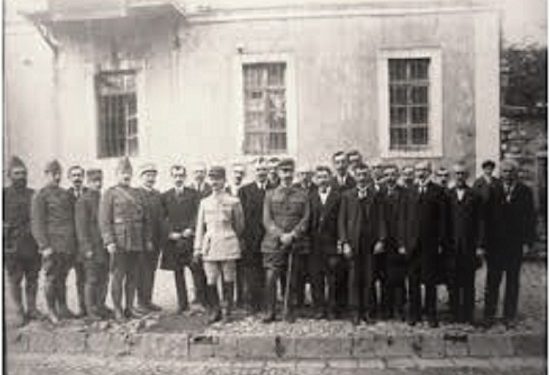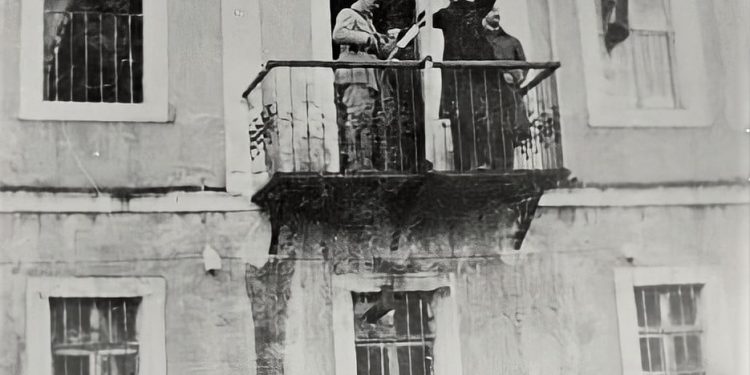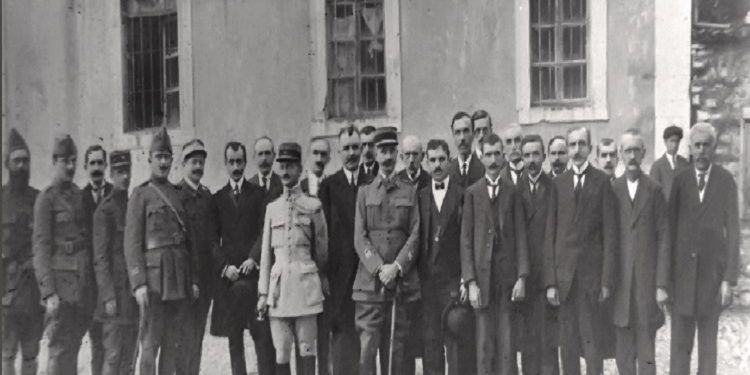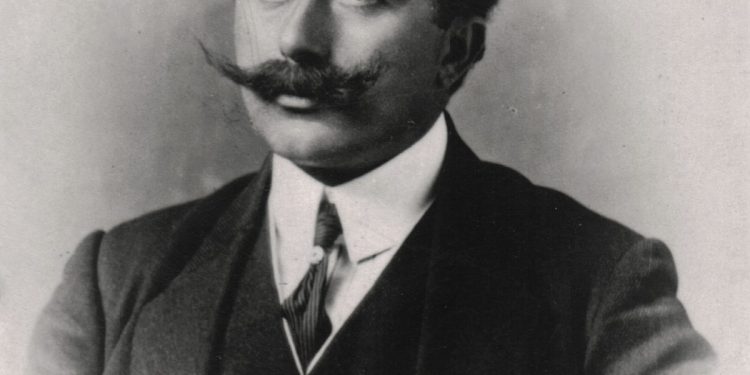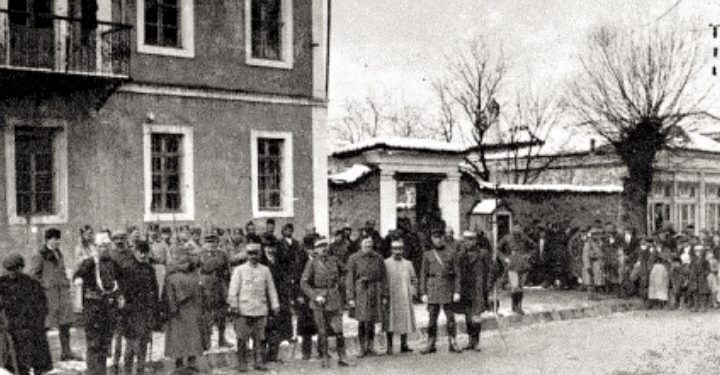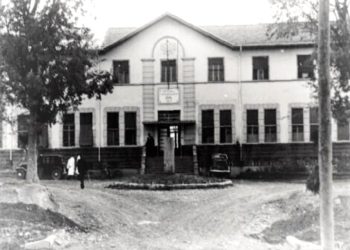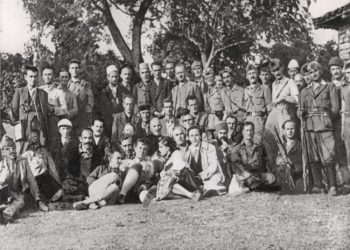By Skifter Këlliçi
Second part
(Reflections on the trial against Themistokli Gërmenji and his shooting on November 9, 1917)
Memorie.al/ November of this year coincide with the 105th anniversary of the death sentence of the great patriot, Themistokli Gërmenji, who was “Activist of the national and democratic movement before and after the Independence of Albania…”! He collaborated with the government of Ismail Qemali in Vlora, in 1913 -1914 and performed important tasks in the state administration”, (Albanian Encyclopedic Dictionary, volume 1, page 764, 2008).
Protocol of December 10, 1916
On December 8, General Sarraj sent a telegram to Dakoen, now commander of the French military forces in Korça, informing him to establish an administration with Albanian officials and local police as soon as possible, under the direction of the prefect. Meanwhile, the French military command would have the right of administrative and military supervision throughout the Korça Region. These recommendations were a consequence of the talks that Dakoeni had with Themistolki a few days ago, “… the conclusions of which the French commander had presented to Sarraj, the commander-in-chief of the French Eastern Army, based in Thessaloniki”. (P. Tako “Themistolki Germenji”, page 243).
As a result, on December 10, 1916, an Albanian commission, headed by dr. Haki Mborja, which also included Themistokliu, was received in the prefecture by the French military authorities, to whom the desire of the people of Korça for self-government under the protection of France was officially expressed.
A protocol was signed by the Albanian commission and Dakoeni on this important issue. Then all the participants of this historic act came out on the balcony of the prefecture, from where Themistoki Gërmenji raised the flag of Albania, accompanied by the cheers of the people of Korça, who waited impatiently in front of the prefecture square, shouting: “Long live Albania!”, “Long live Albania!” flag! .. ”(Adriatic newspaper, December 13, 1916).
Thus, with the will of the people, the city of Korça, together with the counties of Bilisht, Kolonjë, Gora and Opar, formed the Autonomous Province of Korça, ruled by Albanians under the supervision of the French military authorities.
The province would be governed by a council of 14 people, 7 Christians and 7 Muslims, with Albanian officials, approved by the French authorities. Themistokli Gërmenji was appointed prefect. He had the right to lead the volunteer gendarmerie and police to maintain calm and order. In case of war, these formations would be placed under the orders of the French command.
The signing of this protocol was of historical importance because in this way; “The ethnic character of the population of the Korça region was recognized and more suitable conditions were created to fight more forcefully the Greek chauvinist claims over Southern Albania. (“Historical Studies”, 1977/1, M. Çami “Patriotic movement in the region of Korça in the years 1916 – ’17”, pages 74-76).
This opinion is reinforced by the military Tyber, with whom we will be better acquainted in the continuation of this dossier article, when in a report sent to the Eastern Army Command, based in Thessaloniki, he wrote: “Albania, contrary to the legend “It is not a country of thieves, robbers and murderers, on the contrary all Albanians have a common point of view and this is the independence of the country, ignited by the Turkish oppression and the boring tyranny of the Greeks…”, (ibid.). And in another report, Tyber continued: “The violence and intolerance shown by the Greeks (occupiers), towards the Albanians, have united all of them, Muslims and Christians, in a common hatred.”
Another French soldier, Captain Holc, who later met with the eminent patriot Sali Butka in late August 1917, echoed in a message to his superiors the words of Themistocles: “I am not the enemy of France…! We follow the development of events and we have noticed that your administration in Korça ensures the freedom of Albanians. “But if France brings the Greeks there, we will always be ready to shed our blood for our homeland.” (Muin Çami, “On the sentence and execution of Themistokli Gërmenji”, “Historical Studies” no. 4, 1977, page 113).
The French are attacked by the allies!
While this protocol was echoed in Albania and Albanians abroad, in the US, Canada and elsewhere, as described by the newspaper “Sun”, Boston, January 30, 1916, March 20, 21, 1917, moreover by Albanians in the occupation areas German-Austro-Bulgarian, the Italian invaders in the areas of Vlora and Gjirokastra, did not like such an action of their French allies. “France is playing a bad game by allowing the raising of the Albanian flag in the prefecture of Korça. This will create trouble, – declared the Chief of Staff of the Italian General Staff of Vlora. (P.Tako, “Themistokli…”, page 249).
Rome protested in front of the French Foreign Ministry about this action, without consulting the Italian government. For their part, the officials of the French Ministry of Foreign Affairs were surprised by such an action that had been done, without asking the French government and immediately asked for explanations to General Sarraj, as written above, the commander-in-chief of the French army in the Front East based in Thessaloniki. The latter immediately responded that Colonel Dakoen, who was the commander of the French military forces in Korça, with this action, had taken into account the request of the people, that the kaza of this city become an autonomous province. It emerged from these reactions that the French military had not obtained the consent of Paris for this purpose. But already this had become a fait accompli.
It is understood that even the Greek chauvinist circles, not only did not accept the above action, but were also insulted. Especially Venizelos who was already an ally of the Entente, that is, of France. He did not approve of the expulsion of Argyllopus, the former Greek prefect of Korça, and his replacement by Themistokli Gërmenji.
From here begins a new stage in the development of this event, which will be characterized by attacks on the Autonomous Province of Korça and Themistokli Gërmenji, who continued his duty in favor of the patriotic cause.
One of his important decisions was the closure of Greek schools and the opening of schools in the Albanian language, including the establishment of the first Albanian high school. In addition, Themistocles took measures, especially to provide grain in the conditions of a famine that had plagued Korça, as well as measures to protect the borders that were repeatedly violated by Venizelos gendarmes.
Doubts about Themistocles!
These suspicions began in the first week of February 1917. General Grossetti, commander of the French forces based in Florina, began to suspect Themistocles, who, as we have mentioned, had come with his committees from the areas of enemy occupation, where his comrade-in-arms, Sali Butka, with whom he had contacts, was still acting, that one day together with his committees he could do it in Korça. Therefore, for this purpose, he sent a report to General Sarraj. But the latter, trusting Dakoen, did not attach any importance to this report.
Meanwhile, Syrteja (Surete), the Army Security Service, came into play. One of her employees, Lycieni, sent from Thessaloniki to Korça, had several meetings with Dakoen and Themistokli, of course “for work issues”.
Returning to Thessaloniki, Lysieni presented a report to his superiors stating that “Themistokli Gërmenji is very intelligent and currently presents all the guarantees of loyalty.”But we must not forget that he fought against us on the side of the Bulgarians.” (P. Tako “Themistolki…”, page 266).
Then, in order to limit the competencies of the prefect of Korça, he proposed that the gendarmerie, which depended on Themistokli, be seriously strengthened and for this purpose a qualified French commander be charged. This could be the French officer, Tyber, who would combine the work of the gendarmerie with that of the army intelligence service. And so it was. As a result, the Albanian mobile gendarmerie battalion was created, with commander Tyber.
Starting from work, Tyberi began to be heavily influenced by Drioja, the Army Security Inspector in Korça, who was dissatisfied with Dakoeni, who underestimated his reports, especially regarding Themistokli. Thus, even Tyber, already a friend of Driosa, got involved in the whirlpool of this dissatisfaction. The cause was the case of Adem Beqiri, a close associate of Themistokli, who was in charge of tasks in the areas occupied by the Austro-Hungarian occupation forces, where Sali Butka’s troops operated. But even this time, Dakoeni did not pay attention to Drio’s “sensational” reports.
However, Drioja then started to pursue the “Beqiri case” even more persistently, drawing the attention of Benua, who was the general general of Syrta. (P. Tako, “Themistokli…” page 270). Benuaja envied that Syrteja had not been as vigilant as the police commanded by Themistocles. As a result, we launched a crackdown on innocent Albanians, who were imprisoned and interned as suspects for nothing, moreover, without obtaining the consent of Themistocles, that is, the prefect. This greatly revolted Themistocles, who was not yet able to understand that Benuai, through Tyber, was trying to create a conspiracy against the Autonomous Province of Korça, which the Albanians already called a “republic”, and, moreover, against himself. .
Syrtes claws are honored by Themistocles
Sometime in April 1917, unexpected things happened. Tyberi was replaced by Captain Holc. Two weeks later, General Sarraj was forced to remove Dakoen from Korça, although he was sure that Syrta’s reports against Themistocles were false. His place was taken by General Sal, a rigid, sharp and cynical man. Perhaps he too had created the belief that Dacoine had been brought to his knees by Themistocles. In addition, General Sarraj realized that with the creation of the Autonomous Province of Korça, without the consent of Paris, he had overdone it.
The Korçars themselves did not welcome Dakoen’s departure. Especially Themistocles. His departure was seen by the prefect of Korça as the first step in undermining the Autonomous Province. However, the war would not last, the Entente would win, and the French would leave Kor $ a, as promised, leaving it independent. Thus, apparently, Themistocles judged. But in the meantime, Syrta’s pressure on him was growing. Already the architect of this increase in pressure was Benuai himself, whose actions began to be approved without hesitation by General Sal.
He immediately signed the decision to sentence the Albanian gendarme, Mehmet Aliu, allegedly because he had cooperated with the enemy and threatened that others would suffer the same fate. As a result, some Albanians who served in the gendarmerie, out of fear, deserted. These actions against the Albanians revolted Themistokli again. He was forced to send a letter to the French superiors in Thessaloniki, in which he called completely unfair and immoral the way Syrteja acted against the imprisoned patriots and asked the French authorities to put an end to this comedy. Ahmet Beqiri and Abedin Binjaku were being convicted without evidence. (P. Tako “Themistokli…”, page 281).
“If France has regretted what it did and now for one reason or another seeks to abrogate the agreement, I, in order not to get rid of Albanians who go to trial without guilt, I am ready to withdraw. “If France has not repented and will protect the rights of Albanians, then please intervene where it should and the right comes to the fore.” (Historical Museum of Korça, letter of Themistokli dated June 29, 1917).
General Sarraj, after reading the letter, sent a reply to Themistokli, in which he instructed him to continue his duty, that “the sympathy and trust of the commander-in-chief in his person were intact.” (“Post of Korça”, “Murder of the national martyr”, 11.2.1930).
But Benuai did not back down and continued to use more and more violence against the imprisoned Albanians, among whom, as we said above, was Adem Beqiri. He and Abedin Binjaku were transferred from the Florina prison to the Thessaloniki prison, and after a brief trial, both were sentenced to death as collaborators of the Austro-Hungarians.
Adam, according to the decision, was to be shot on August 23, 1917, but Benuai deliberately postponed the sentence until August 27, so that he could give him “information” and then forgive him. And when Adam refused, the Benoit executioners inflicted inhuman torture on him, until he was forced to assert what the great French Security chief demanded. So that he had been sent three times on duty by Themistocles to Plasa, to deliver a package to the German officers.
They were disgusting fabrications, because Themistocles, if he wanted to, could find other ways to connect with Albanians in the areas occupied by the Austro-Hungarians. Moreover, during those days when he was accused of being in Plasa (February 12, 1917), Adem Beqiri had served in Korça and this was evidenced by the meeting he had with Themistokli and French officers, who had charged him with other duties. .
At the same time, Syrtes’ inspector, Drio, did not stop with other fantastic reports against Themistocles, which he sent to Benoit, who forwarded them to General Sal. Sali understood that Drioja was slandering, but, nevertheless, he tacitly approved of his reports. It was the time when Paris, after the transfer of the government of Venizelos, ally of the Entente, from Thessaloniki to Athens, in the summer of 1917, was approaching the Greek chauvinist policy towards Albania.
Consequently, General Sal proposed to Themistocles that Greek schools be reopened. But Themistokliu openly opposed him: “The Albanian government will never allow the opening of Greek schools in Korça. (Petro Harizi, “Chronographic History”, page 204). Thus the clutches of Syrta were gradually honored over Themistocles, even with the tacit approval of the major officers Groseti and Sal.
They did not find it difficult to eliminate Themistocles with a bullet in the back, but they knew that they would not have it easy, given the great authority he enjoyed in Korça. So they expected to plot a dense network of “new compromising facts”, to hit the prefect and the Autonomous Province of Korça, or the Albanian Republic of Korça.
Therefore, they arrested Fehmi Zboqi and Ciz Mehmeti, whom Themistokli had sent to the areas occupied by the Austro-Hungarians. Both were subjected to torture, as was Adem Beqiri, even in the presence of Inspector Drio himself. In these circumstances, they both claimed that the prefect of Korça, Themistokli Germenji, had cooperated with the enemy.
“Their allegations, Benuai pointed out; categorically prove Themistocles’s guilt, an offense contained in Article 25 of the Army Code, which in this case provided for the death penalty.” (P.Tako, “Themistokli…”, page 289). “Therefore, Themistocles had to be arrested for having links with the enemy, in order to assist in his plans.” (Yes there). So, full of pleasure, Benoit hurried to Florina, to inform Grosset, the commander of the French forces in this city. And he gave the alarm that the prefect of Korça should no longer be trusted.
The claws should already be clenched in Themistocles’s throat. For this purpose, Grosset instructed Lieutenant De Marie, to go from Florina to Korça, to finally complete Themistokli’s file. In case he would realize this with new and even more compromising facts, Grosset promised to decorate him with the “Cross of the Legion of Honor”. Memorie.al
The next issue follows




